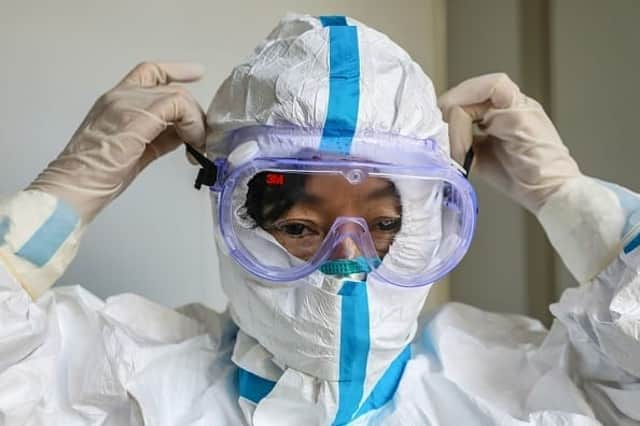This is the latest travel advice as Brits returning from China are quarantined


The UK government is to chart a final flight to bring back British nationals still in coronavirus-hit Wuhan on Sunday (9 Feb).
British travellers who are in mainland China have been urged to leave if they can, after the UK Foreign and Commonwealth Office (FCO) amended its travel advice on Tuesday (4 Feb), advising against all travel to Hubei Province due to the ongoing coronavirus outbreak.
Brits advised against all travel


Advertisement
Advertisement
The plane is expected to leave in the early hours of Sunday morning (9 Feb) local time and will land at RAF Brize Norton, the Foreign Office said.
The FCO added that they want to ensure that all British nationals in Hubei province contact their team to register if they want to leave on the flight.
It is understood that 165 Britons and their dependants still remain in Hubei province, the epicentre of the outbreak, while a further 108 people have requested assistance to leave as of the early hours of Wednesday (5 Feb).
The FCO updated its travel advice after Health Secretary Matt Hancock said he expects more cases to be diagnosed in the UK.
Advertisement
Advertisement
The death toll from coronavirus in China has now reached 490, with one more fatality having been recorded in the Philippines.
A further 3,887 new cases have also recently been confirmed by China’s Health Commission, taking the total number of cases in the country to 24,234.
Brits have been urged tourists against all but essential travel to the rest of mainland China, not including Hong Kong and Macao.
The British Consulates-General in Wuhan and Chongqing are currently closed. Brits who are in China and able to leave are now being urged to do so.
Advertisement
Advertisement
Foreign Secretary Dominic Raab said: “We now advise British nationals in China to leave the country if they can, to minimise their risk of exposure to the virus.
“Where there are still British nationals in Hubei province who wish to be evacuated, we will continue to work around the clock to facilitate this.”
The FCO added that commercial flights departing from China were available throughout the country, except in Hubei where the virus originated.
Returning Brits to be put under quarantine
British travellers returning to the UK from China are to be put under quarantine as the World Health Organisation declares the coronavirus outbreak a global health emergency.
Advertisement
Advertisement
More than 80 Brits on an evacuation flight from the Chinese city of Wuhan, where the virus is thought to have originated, were due to land at the Brize Norton RAF base in Oxfordshire around 1pm on 31 January according to a statement from the Foreign & Commonwealth Office (FCO).
The passengers were to be taken to an NHS facility on the Wirral for a quarantine period of 14 days.
They are believed to be staying in a former student accommodation block in the grounds of Arrowe Park Hospital.
The evacuation comes as the two first cases of coronavirus in the UK are confirmed.
Advertisement
Advertisement
The patients, who are from the same family, are being treated at a specialist centre in Newcastle.
What does quarantine mean?
Quarantine means restricting the movement of people who may have been exposed to an infectious disease in an effort to prevent the spread.
Those placed in quarantine may not have a confirmed medical diagnosis, but could pose a risk of spreading a virus due to exposure.
It is possible that British travellers returning to the UK could have the virus and not know it, as they may not yet be showing symptoms.
Advertisement
Advertisement
As a precaution, they are put into separate and isolated conditions away from the general public.
More than 80 Brits are to be taken to an NHS facility on the Wirral for a quarantine period of 14 days (Photo: Getty Images)
What happens during quarantine?
The British passengers in quarantine will likely be tested for the virus when they land, using a throat swab
Those who test positive for the virus could then be isolated from the rest, while others who display symptoms are likely to be taken to hospital.
Advertisement
Advertisement
The remaining individuals will then be observed for developing symptoms during the 14-day period at the NHS facility, and may be assessed by doctors, nurses and screening experts over the next two weeks.
Tests for coronavirus involve taking samples from a person’s nose, throat and respiratory tract, which are then sent to a laboratory for analysis.
Results from these tests are usually returning within 24 hours.
Medical staff, aircraft staff and bus drivers transporting the travellers to the facility will wear protective suits.
How to stay safe
Advertisement
Advertisement
There are currently no vaccines to protect against the coronavirus, but there are ways to help reduce your risk of contracting it.
The Centers for Disease Control and Prevention (CDC) advises:
Washing your hands often with soap and water for at least 20 secondsAvoiding touching your eyes, nose, or mouth with unwashed handsAvoiding close contact with people who are sick
If you are experiencing cold-like symptoms, you can help reduce the risk of spreading it by staying at home while you are ill, and avoiding close contact with others.
You should cover your mouth and nose with a tissue when you cough or sneeze, and throw this away before washing your hands. It is also recommended to clean and disinfect objects and surfaces.